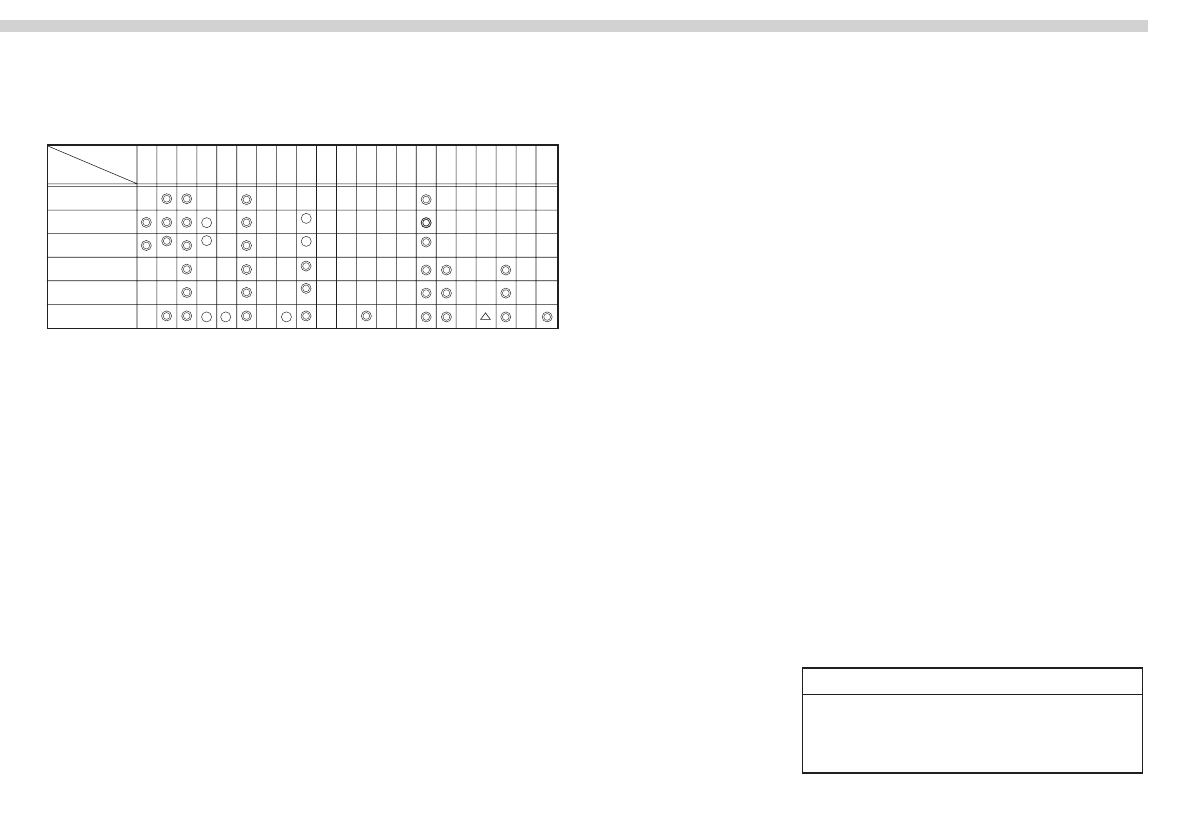
1514
RECOMMENDED FOCUSING SCREEN
Various interchangeable focusing screens are available for Nikon cameras to suit
any type os lens or picture-taking situation. Those which are recommended for use
with your lens are listed below.
For determining the frame type and focusing
F6
F5
with DP-30
F5
with DA-30
F4
with DP-20
F4
with DA-20
F3
Camera
Screen
I
deal
Can be used even though part of the view is a little hard to see
Split image focusing is possible. but focusing is inaccurate
Correction value for center-weighted metering
When using the F6, you can correct the exposure value by setting “b6: Screen
Conpensation” to “Except for B and E” in the Customize menu.
When using a camera model othre than B or E. set this to “Except for B and E”
regardiess of whether the correction weight is set to “0” When using the F5.set the
compensation for the exposure value in custom setting number 18. When using a
camera from the F4 series, turn the exposure adjustment diat for the finder screen to
set the compensation.
For details, reter to the instruction manual for the camera you are using.
Blank=Unsuitable
However, when using the M screen, this value is not used in order to allow you to use
a rate of 1 to 1 or higher for close-up photography.
When using a camera other than one listed above with a B2/B3, E2/E3, or K2/K3 screen
refer to the B, E, or K column respectively.
MINIMUM APERTURE LOCK
For Programmed auto or Shutter-priority auto exposure shooting. use the
minimum aperture lock lever to lock the lens aperture at f/16.
1. Turn the aperture ring so that f/16 on the aperture scale is alignae with the white
aperuture indes dot.
2. Slide the lock lever in the direction of the aperuture ring so the white dot on the
lever aligns with the orange dot (Illust. B).
To release the lock, slide the lever in reverse direction.
USING BUILT-IN LENS HOOD
Pull out the hood and turn it counterclockwise for two rotations (see Illst. C). To
store, turn the hood clodkwise and push back.
LENS CARE
• Clean lens suface with a blower brush. To remove dirt and smudges, use a
soft, clean cotton cloth or lens tissue moistened with ethanol (alcohol) or lens
cleaner. Wipe in a circular motion from center to outer edge, taking care not to
leave traces and not to touch the other lens parts.
• Never use thinner or benzine to clean the lens.
•
To protect the lens surface from dirt or damege, use of an NC filter is
recommended at all times. The lens hood also heope protect the lens.
• Cover lens with lens cap when lens is not in use.
• Attach both front and rear caps when the lens is stored separately.
• If you will not use the lens for a long time, protect it from rust and mold by
storing it in a cool, dry place. Also, do not store in direct sunlight, and keep it
away from naphthalene or camphor.
• Be careful not to get the lens wet or drop it in water. Water on the lens may
cause malfunction.
• Reinforced plastic is used on the exterior of the lens unit; to avoid damage,
take extra care to never leave the lens in an excessively hot place.
SPECIFICATIONS
Focal length:
Maximum aperture:
Lens construction:
Picture angle:
Distance scale:
Distance imformation:
Aperture scale:
Minimum aperture lock:
Diaphragm:
Focusing:
Exposure measurement:
Mount:
Attachment size:
Dimensions:
Weight:
135mm
f/2
7 elements in 6 groups (plus built-in rear glass plate
for dust protection)
18°
Graduated in meters and feet from 1.1m (4 ft.) to
infinity (∞)
Output into camera body
f/2 to f/16 on both standard and aperture-direct-
readout scales
Provided
Fully automatic
Nikon Rear Focusing (RF) system
Via full-aperture method for Al cameras or cameras
with CPU interface system; via stop-down method for
other cameras
Nikon bayonet mount
72mm(P=0.75mm)
Approx, 79mm dia. x 120mm extension from the
camera’s lens mounting flenge; overall length is
approx. 128mm
Approx. 815g
OPTIONAL ACCESSORIES
72mm screw – in filters
Hard lens case CL-38
EC-B/
EC-E
A/L B C D E G1 G2 G3 G4 H1H2H3H4 JK/PM R TFU
(
+0.5
)(
+0.5
)
(
+0.5
)
(
+1.0
)
(
-1.0
)
(
-1.0
)
(
+0.5
)


















